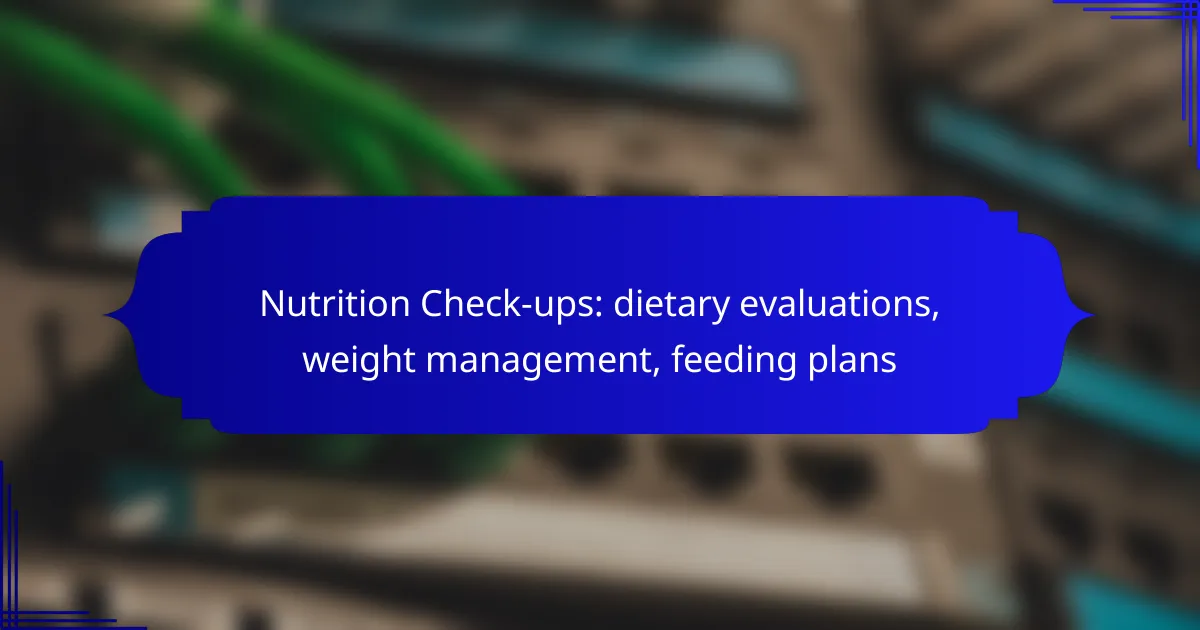Nutrition check-ups provide a comprehensive evaluation of dietary habits, weight management, and personalized feeding plans. By identifying areas for improvement, these assessments offer tailored nutritional guidance that supports individuals in achieving their health goals effectively.

What are nutrition check-ups in Australia?
Nutrition check-ups in Australia involve systematic evaluations of dietary habits, weight management, and personalized feeding plans. These assessments aim to optimize health through tailored nutritional guidance and support.
Comprehensive dietary evaluations
Comprehensive dietary evaluations assess an individual’s eating patterns, nutrient intake, and lifestyle factors. Registered dietitians typically conduct these evaluations through detailed questionnaires and food diaries, allowing them to identify nutritional deficiencies or excesses.
During the evaluation, factors such as age, gender, activity level, and health conditions are considered. This holistic approach helps in creating a clearer picture of a person’s dietary needs and potential areas for improvement.
Weight management assessments
Weight management assessments focus on understanding an individual’s weight history, current weight status, and body composition. These assessments often include measurements like body mass index (BMI) and waist circumference, which provide insights into health risks associated with weight.
Professionals may also discuss lifestyle habits, including physical activity levels and dietary choices, to create a comprehensive weight management strategy. Setting realistic weight goals and monitoring progress are crucial components of this process.
Personalized feeding plans
Personalized feeding plans are tailored dietary strategies designed to meet individual health goals and preferences. These plans take into account the results of dietary evaluations and weight assessments to ensure they are both practical and effective.
For example, a feeding plan may include specific food recommendations, portion sizes, and meal timing to support weight loss or improve overall nutrition. Regular follow-ups can help adjust the plan as needed, ensuring ongoing success and adherence.

How do nutrition check-ups improve health?
Nutrition check-ups enhance health by providing personalized dietary evaluations that identify areas for improvement. These assessments help individuals create effective feeding plans and manage their weight more successfully.
Identify nutritional deficiencies
Nutrition check-ups are essential for identifying nutritional deficiencies that may affect overall health. During these evaluations, healthcare professionals analyze dietary habits and may recommend blood tests to pinpoint specific deficiencies, such as low iron or vitamin D levels.
Common deficiencies can lead to various health issues, including fatigue, weakened immunity, and bone health problems. Addressing these deficiencies through tailored dietary changes can significantly improve energy levels and overall well-being.
Support weight loss goals
Nutrition check-ups play a crucial role in supporting weight loss goals by providing tailored feeding plans that align with individual needs. These plans often include calorie recommendations and macronutrient distributions that promote healthy weight loss, typically aiming for a gradual reduction of 0.5 to 1 kg per week.
Setting realistic goals and tracking progress during check-ups can help maintain motivation and accountability. It’s essential to avoid extreme diets that can lead to nutrient deficiencies and unsustainable results.
Enhance overall wellness
Regular nutrition check-ups contribute to enhancing overall wellness by promoting balanced eating habits and lifestyle changes. These evaluations encourage individuals to adopt a holistic approach to health, focusing not only on diet but also on physical activity and mental well-being.
Incorporating a variety of foods from all food groups can help ensure adequate nutrient intake, which is vital for maintaining energy levels and reducing the risk of chronic diseases. Simple strategies, such as meal prepping and mindful eating, can further support long-term wellness goals.

What services are included in nutrition check-ups?
Nutrition check-ups typically include a range of services designed to evaluate dietary habits, manage weight, and create personalized feeding plans. These services help individuals achieve their health goals through tailored approaches based on their unique needs.
Individualized meal planning
Individualized meal planning focuses on creating a dietary strategy that aligns with a person’s health objectives, preferences, and lifestyle. A registered dietitian will assess current eating habits and nutritional requirements to develop a customized meal plan that promotes balanced nutrition.
When crafting a meal plan, consider factors such as food allergies, cultural preferences, and daily activity levels. For example, a meal plan for someone aiming to lose weight may emphasize lower-calorie options, while a plan for an athlete may include higher carbohydrate intake for energy.
Body composition analysis
Body composition analysis measures the proportions of fat, muscle, and water in the body, providing insight into overall health beyond just weight. This analysis can be conducted using various methods, including bioelectrical impedance and skinfold measurements.
Understanding body composition helps tailor weight management strategies effectively. For instance, a higher muscle mass may indicate a need for increased caloric intake to support muscle maintenance, while a higher fat percentage may suggest a focus on fat loss through dietary adjustments.
Ongoing support and follow-up
Ongoing support and follow-up are crucial components of nutrition check-ups, ensuring individuals stay on track with their dietary goals. Regular check-ins with a nutritionist can help address challenges, adjust meal plans, and provide motivation.
Typically, follow-up sessions may occur every few weeks or monthly, depending on individual progress and needs. This continuous support can significantly enhance adherence to dietary changes and lead to more sustainable health outcomes.

How to choose a nutritionist in Australia?
Choosing a nutritionist in Australia involves assessing their qualifications, reading client feedback, and evaluating the services they offer. This ensures you find a professional who meets your dietary needs and preferences.
Check qualifications and certifications
Start by verifying the nutritionist’s qualifications and certifications. In Australia, look for a degree in nutrition or dietetics and accreditation from the Dietitians Association of Australia (DAA).
Additionally, check if they have any specialized training in areas relevant to your needs, such as weight management or sports nutrition. This can enhance their ability to provide tailored advice.
Read client testimonials
Client testimonials can offer insights into a nutritionist’s effectiveness and approach. Look for reviews on their website or third-party platforms to gauge client satisfaction.
Pay attention to feedback regarding their communication style, supportiveness, and the results clients have achieved. This can help you determine if their methods align with your expectations.
Evaluate service offerings
Assess the range of services offered by the nutritionist to ensure they align with your goals. Common services include dietary evaluations, personalized meal plans, and ongoing weight management support.
Consider whether they provide in-person consultations, online sessions, or a combination of both. This flexibility can be crucial in maintaining regular contact and accountability.

What are the costs of nutrition check-ups?
The costs of nutrition check-ups can vary widely based on location, provider, and the complexity of services offered. Generally, individuals can expect to pay anywhere from a modest fee to several hundred dollars for comprehensive evaluations and personalized plans.
Average pricing in major cities
In major cities, the price for a nutrition check-up typically ranges from $75 to $250 for an initial consultation. Follow-up sessions may cost between $50 and $150. For example, in New York City, a standard session might be on the higher end, while in smaller cities, prices could be more affordable.
It’s important to consider that some providers may offer sliding scale fees based on income, which can help make services more accessible.
Insurance coverage options
Many health insurance plans cover nutrition check-ups, particularly if they are deemed medically necessary for conditions like diabetes or obesity. Coverage can vary significantly, so it’s advisable to check with your insurance provider regarding specific benefits and requirements.
Some plans may require a referral from a primary care physician, while others might have restrictions on the number of visits covered per year. Always confirm your plan’s details to avoid unexpected costs.
Package deals and discounts
Many nutritionists and dietitians offer package deals that can reduce the overall cost of multiple sessions. For instance, purchasing a package of five sessions might save you 10-20% compared to paying for each session individually.
Additionally, some clinics may provide discounts for group sessions or workshops, which can be a cost-effective way to receive guidance while sharing the experience with others. Always inquire about available promotions when scheduling your appointment.

What are the benefits of regular dietary evaluations?
Regular dietary evaluations offer significant advantages for maintaining optimal health and managing weight. They provide insights into eating habits, nutritional deficiencies, and areas for improvement, enabling tailored feeding plans that support individual goals.
Track progress over time
Tracking progress through regular dietary evaluations helps individuals understand their nutritional journey and make informed adjustments. By documenting changes in weight, body composition, and dietary habits, one can identify patterns and trends that inform future decisions.
For effective tracking, consider maintaining a food diary or using mobile apps that log meals and physical activity. Aim to review this data monthly to assess whether dietary changes are leading to desired outcomes, such as weight loss or improved energy levels.
Common pitfalls include neglecting to record all meals or becoming discouraged by temporary fluctuations. Focus on long-term trends rather than day-to-day changes to maintain motivation and clarity in your dietary goals.
